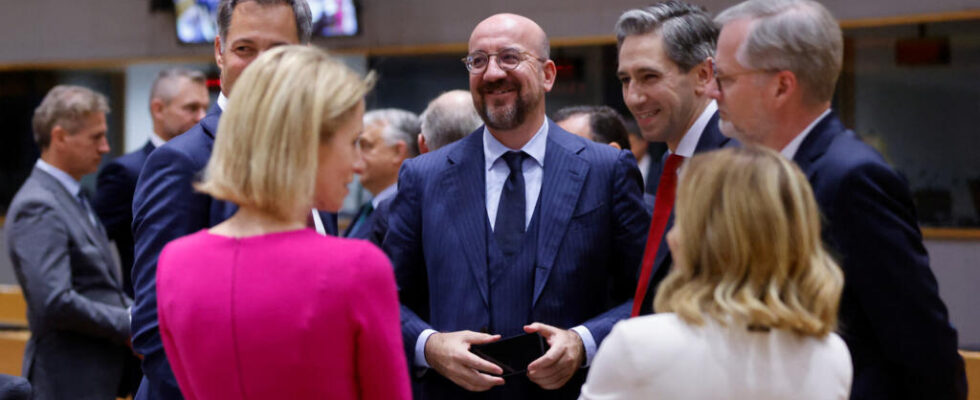The Twenty-Seven will continue their negotiations with a view to a formal agreement at the end of June on key EU positions, after a first round of discussion on Monday at the end of which Ursula von der Leyen remained favorite for the head of the EU. European Commission.
3 mins
It was the first meeting of EU heads of state and government since the European elections in which Eurosceptic and nationalist parties made a breakthrough, notably inflicting a setback in France on President Emmanuel Macron and in Germany on Chancellor Olaf Scholz.
Gathering for a dinner in Brussels, European leaders discussed candidates for the positions of president of the European Commission, president of the European Council and head of European diplomacy. European leaders are expected to choose again Ursula von der Leyen For a second term at the head of the European executive. Leaders have increased their support for the reappointment of Ursula von der Leyen, 65, as head of the European Commission.
“ It was a good conversation. [Cela] is going in the right direction. But there was no agreement tonight », declared the current President of the European Council, Charles Michel, to journalists after the dinner. Proposals have been made and additional work is necessary, he added, without further details. The Belgian official stressed, however, that a decision was in any case not expected before another summit of EU leaders on June 27-28 in Brussels. “ It is our collective responsibility to make a decision by the end of June », added Mr. Michel.
“It has to simmer, I think we are not that far away,” judged French President Emmanuel Macron at the end of this meeting.
The EPP is trying to impose itself
The leading political force in the European Parliament, where it clearly strengthened following the June 6-9 vote, the European People’s Party (EPP, right), which supports Ursula von der Leyen, nevertheless sought to push its advantage during the talks, according to diplomatic sources. The EPP’s demands then prevented the announcement of a global agreement also covering the other positions, that of president of the European Council and head of European diplomacy. The distribution must take into account the political balances in the EU following the European elections, but also geographical ones.
After its victory in the European elections, the EPP claims to be head of the Brussels Commission, which it has held for around twenty years. The Social Democrats, who constitute the second group in the European Parliament, are for their part demanding the presidency of the European Council and the former Portuguese Prime Minister Antonio Costa is expected. According to diplomatic sources, the EPP however proposed on Monday that the presidency of the Council, a mandate of two and a half years renewable once, be shared during the legislature between the social democrats who would first obtain the position, before he moves to a conservative in two and a half years.
Also at stake, the post of High Representative for Foreign Affairs was until now occupied by the Spanish socialist Josep Borrell who is retiring at the age of 77. Estonian Prime Minister Kaja Kallas is well placed to succeed him. This 46-year-old liberal would be the only Eastern European among these key positions. The leader became known for her unwavering support for Ukraine in the war started by Russia, a country bordering Estonia.
Read alsoKaja Kallas, Prime Minister of Estonia: “Europe is deadly”
At the head of the European Parliament since January 2022, the Maltese Roberta Metsola (PPE), 45, should unless there is a surprise return, for a mandate of two and a half years.
To be nominated, Ursula von der Leyen needs to collect a “qualified majority” of at least 15 countries, representing 65% of the European population. If she is indeed chosen by the leaders, Ursula von der Leyen will then have to be dubbed by an absolute majority of 361 newly elected MEPs. In 2019, she was narrowly elected, with 9 votes in advance.
